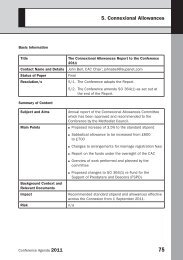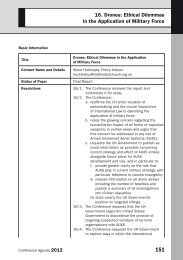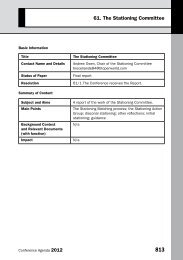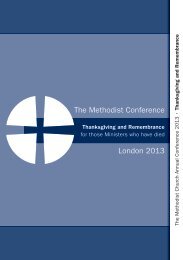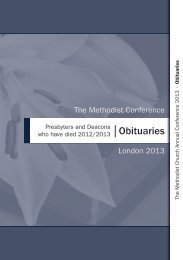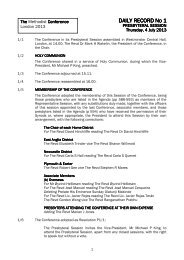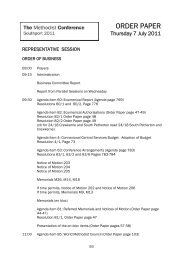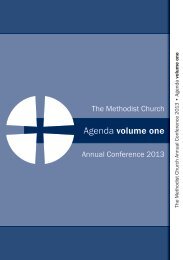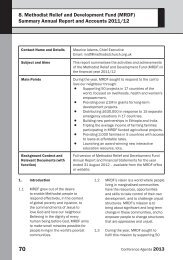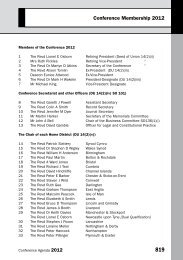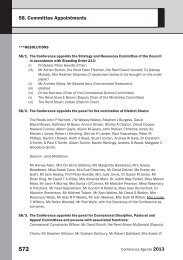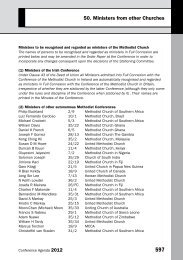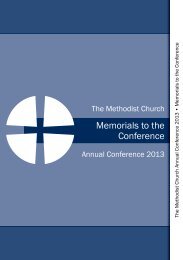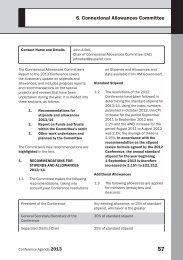Agenda Volume 3 - Methodist Conference
Agenda Volume 3 - Methodist Conference
Agenda Volume 3 - Methodist Conference
You also want an ePaper? Increase the reach of your titles
YUMPU automatically turns print PDFs into web optimized ePapers that Google loves.
57. The Fruitful Field Project<br />
colleges and centres is that of<br />
maintaining a balance between<br />
expenditure on educational activity<br />
and tutorial staff on the one hand,<br />
and on bursarial functions (such<br />
as administrative staff, domestic<br />
activities, and premises) on the<br />
other. The proportion of expenditure<br />
which many of our institutions have<br />
been able to dedicate to educational<br />
activity and tutorial staff has been<br />
higher than that achieved in the<br />
secular sector, which has brought<br />
significant benefits. However, it has<br />
also meant, within a wider context<br />
of tight budgets, that expenditure on<br />
premises in particular may not have<br />
been as high as it ought to have<br />
been to maintain buildings, teaching<br />
spaces and student accommodation<br />
to a good standard. Added to these is<br />
the need to be proactive in meeting<br />
new requirements and expectations<br />
(eg the 2010 Equality Act enabling<br />
disabled students to take part in the<br />
full range of activities of student life<br />
at learning institutions). Moreover it<br />
has rarely been possible to identify or<br />
to set aside funds for even moderate<br />
capital expenditure projects. Five<br />
institutions directly or indirectly<br />
governed by the <strong>Conference</strong> and<br />
the <strong>Methodist</strong> Council currently face<br />
the need to embark on projects to<br />
maintain, refurbish and improve their<br />
premises which involve expenditure<br />
of approximately £12.3 million. The<br />
free reserves available within the five<br />
institutions to support this work stand<br />
at approximately £4.5 million. Other<br />
institutions are unable to embark on<br />
expansionary projects which require<br />
moderate levels of capital expenditure<br />
as funds to support these activities<br />
are not available.<br />
91 This scale of the potential investment<br />
opportunities across the Connexion<br />
challenges the <strong>Conference</strong> to respond<br />
in a coherent and holistic way to a<br />
number of significant decisions within<br />
different institutions. The challenge is<br />
a bold one – to make sure that we are<br />
making the best use of the premises<br />
which the <strong>Conference</strong> dedicates to<br />
learning activities.<br />
Changes in the Higher Education sector<br />
92 A further set of challenges emerges<br />
from the changes taking place<br />
within the Higher Education (HE)<br />
sector. Government changes to HE<br />
funding mean that a form of hidden<br />
subsidy which has supported the<br />
Church’s theological education<br />
activities has now been removed.<br />
In narrow terms, this means that<br />
it is extremely likely that the costs<br />
for the Church of engaging with<br />
theology departments in the HE<br />
sector will increase. It is also very<br />
likely that serious questions will be<br />
raised about the future of theology<br />
departments within many universities.<br />
The long-term consequences of the<br />
HE sector changes currently being<br />
implemented are likely to be more<br />
far-reaching still. A more competitive<br />
and diverse sector is envisaged by<br />
the government’s reforms. Therefore,<br />
as well as navigating a reactive<br />
path through present insecurities<br />
as universities absorb the effects of<br />
674 <strong>Conference</strong> <strong>Agenda</strong> 2012



